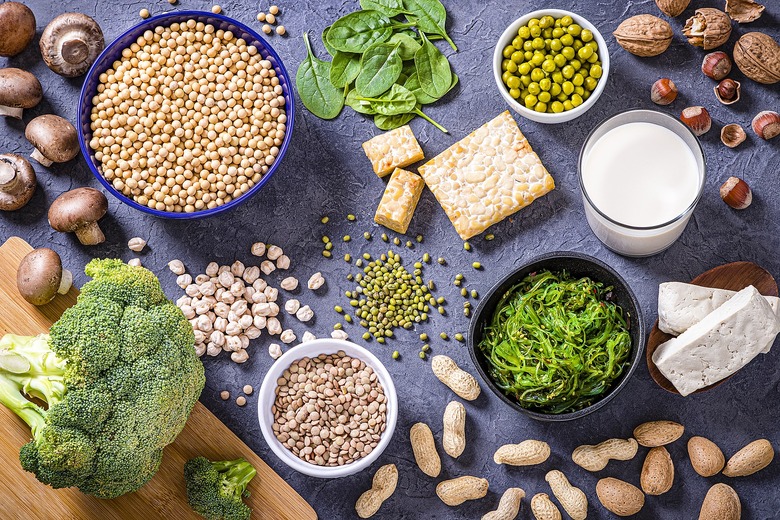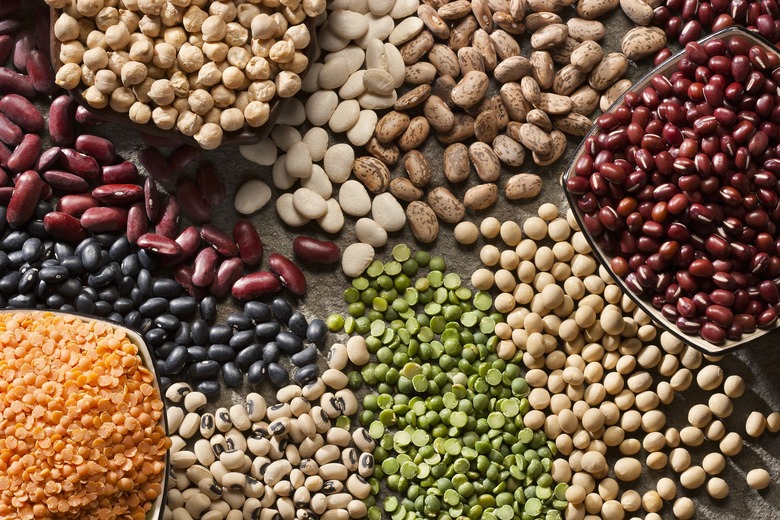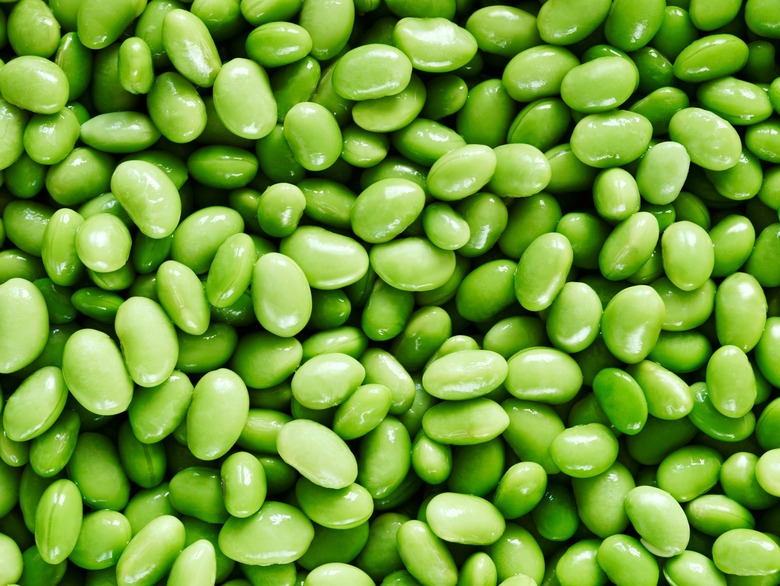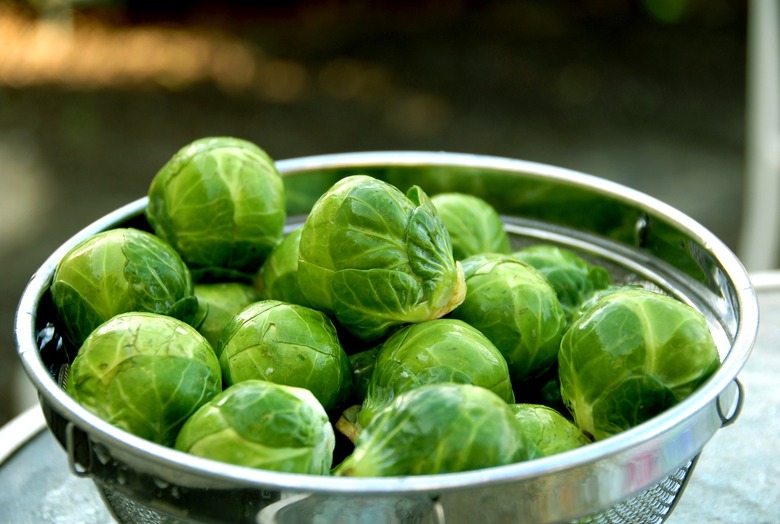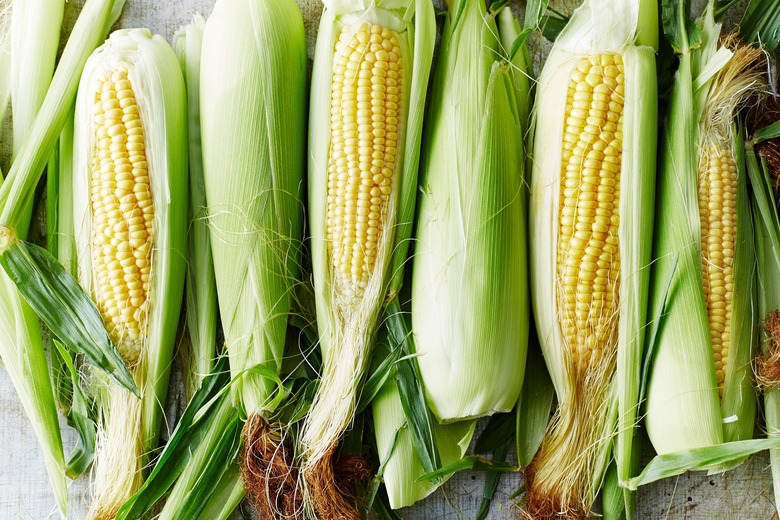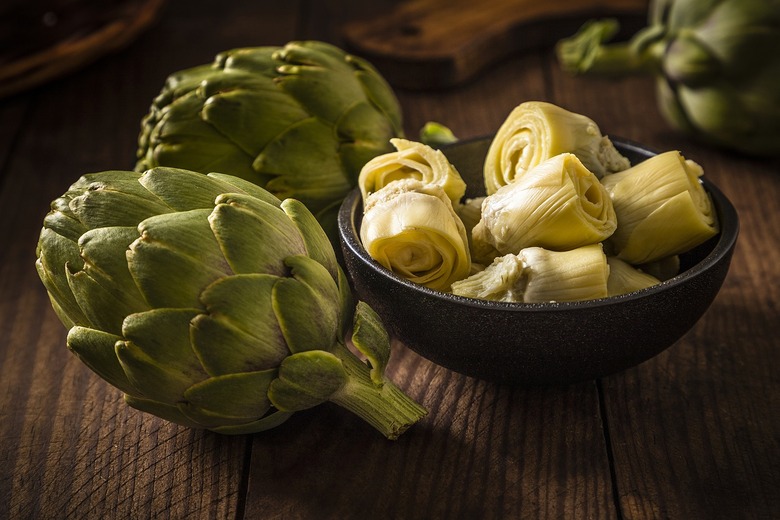12 Protein-Packed Vegetables And How To Cook Them
Protein plays a major role when it comes to building muscle and other tissue in your body. Protein is formed by amino acids and used to produce enzymes, hormones and hemoglobin throughout the body. How much protein you need depends on your age, height, weight, sex and level of physical activity. Meat is the most common way people fit protein into their daily diet, but it's far from the only way to get this needed essential macronutrient.
Plant-based products such as soy, tempeh and tofu are all great sources of protein, according to the United States Department of Agriculture's (USDA) list of different foods and their protein content, but certain vegetables can be great sources of protein too.
Legumes and beans
If you're interested in looking for a source of protein other than meat, look at legumes and beans. Chickpeas, black beans, green peas and lentils are a few good examples of high protein legumes and beans. Just one cup of cooked lima beans can contain about 12 grams of protein. Learn how to cook these beans right by making a summery succotash with lima beans, black bean soup or quinoa and lentil stuffed peppers. In addition to being high in protein, beans and legumes can help reduce cholesterol and decrease blood sugar levels.
Soybeans and soybean sprouts
The next time you eat Korean bibimbap, consider adding a handful of soybeans or soybean sprouts to replace the meat. Soybeans are one of the best plant-based proteins you can eat; one cup of raw frozen edamame has about 13 grams of protein while one cup of cooked soybean sprouts can contain about 8 grams of protein. On your next trip to the grocery store, pick up some edamame to munch on as a snack or to use in this black rice dish, this baked brown rice and edamame or an edamame-based succotash.
Potatoes
Potatoes provide a good source of potassium and fiber, which can decrease blood pressure and support heart health. And they're also rich in protein. One large baked Russet potato with the skin contains about 8 grams of protein. Fit protein into your diet by including baked potatoes or other amazing potato recipes in your weeknight dinners.
Brussels sprouts
Brussels sprouts are full of vitamin C, which can help maintain your eye and skin health. But this favorite veggie is also a decent source of protein. One cup of raw Brussels sprouts contains about 3 grams of protein. Roasting is one of the basic cooking methods people use with Brussels sprouts. Spice things up with crispy Brussels sprouts with a Sriracha aioli on the side.
Sweet corn
There are plenty of ways to make sweet corn. Whether you choose to grill or boil it, you can get a decent amount of protein by adding corn to your daily diet. One cup of sweet corn kernels contains about 5 grams of protein. Stock up your pantry with canned or frozen corn or buy fresh ears from your local farmers market so you can make this amazing corn skillet with bacon, basil and tomatoes.
Spinach
Spinach is a yummy leafy green that you can include in your salads. It can also help you squeeze in some protein for the day. One cup of raw spinach contains 0.86 grams of protein, which is a decent option for lunch. Cooked spinach — like the kind you buy frozen — is far more dense and has about 5 grams of protein per cup, so take those leafy greens and turn them into a stir fry or creamed spinach. Spinach is also full of other healthy nutrients you should include in your diet, such as vitamin K, vitamin A, vitamin C, iron and more.
Sweet potatoes
How do you like to eat sweet potatoes? Baked? Mashed? Whichever way you choose, sweet potatoes are a healthy source of carbs and fiber that can improve your gut health. And they also add protein to your diet. One cup of baked sweet potato has about 2.5 grams of protein. Though it may not be as much as some other vegetables, add sweet potatoes to any of your meals along with other protein-packed vegetables to increase your daily protein intake.
Broccoli
If you hated broccoli as a kid, you might want to give it another chance as an adult. Whether you enjoy it raw or cooked, broccoli is a good source of protein compared to other vegetables. One cup of uncooked broccoli contains over 4 grams of protein. It's also packed with healthy amounts of vitamin C and K, iron, potassium and fiber. Still not convinced? Try this roasted broccoli parmesan, caramelized broccoli with romesco sauce or the Midwestern favorite: broccoli casserole.
Artichokes
Artichokes are rich in fiber, protein and other nutrients and contain about 4 grams of protein when raw and about 3 grams when cooked. Artichokes may best be known as a part of a dip mixed with spinach, but it's worth trying this grilled artichoke recipe as a nutritious side dish.
Mushrooms
Don't look down on mushrooms; these fungi are packed with nutritional value. They're low in calories and provide necessary nutrients for people who don't eat meat, such as niacin, D vitamins and the B vitamin riboflavin. You can get a fair amount of protein from them as well. One cup of sliced cooked Portobello mushrooms has about 4 grams of protein. At your next barbecue, serve up this lemon grilled Portobello mushroom with burrata and tomatoes.
Asparagus
Asparagus is a great source of vitamin C and iron, and you can also receive a fair amount of protein from this green vegetable. One cup of cooked asparagus contains over 5 grams of protein. Roasting asparagus is probably the easiest way to cook this veggie, but you can also cook it in a skillet or make balsamic marinated asparagus.
Avocado
Though we know it's a fruit, people tend to eat avocados like a vegetable. This ever-popular produce is commonly eaten as a part of avocado toast, but you can also use cut-up avocado to upgrade your salad or make guacamole from scratch. This superfood is full of nutrients that include healthy fats, fiber and protein. One cup of sliced avocado has around 3 grams of protein. Avocados can make a great addition to simple dishes like this cheesy quesadilla, a fantastic vegetarian option for dinner.
More from The Daily Meal:
High Protein Breakfasts That Aren't Eggs
Heart Healthy Foods to Add to Your Diet
13 Vegetarian Grilling Recipes to Serve at Your Next Cookout
Vegan Recipes That Will Make You Want to Go Plant-based
Turmeric Lattes, Ginger Soup and More Recipes for a Happier, Healthier You
